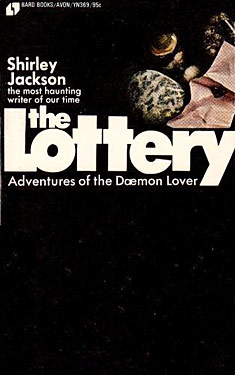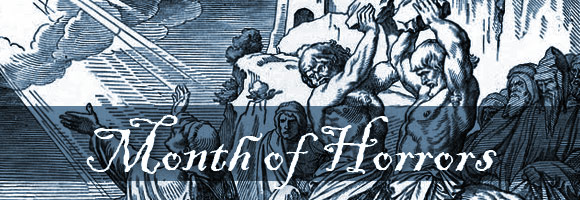Month of Horrors: In Praise of Unhappy Endings
Since this is my first post for Month of Horrors, I thought I might make it a comment on the worthiness of horror as a genre. I must confess that I have not read many of the books in the HWA Reading List, but I have long been a fan of Shirley Jackson’s short story, The Lottery. Initial reaction to the story was negative, sparking hundreds of angry letters and negative comments. One letter even came from her own mother, who declared: “this gloomy kind of story is all you young people think about these days.”
 To give too many details of Jackson’s classic story would be redundant. It is a very short story as it is. Suffice it to say, it’s about an annual stoning that takes places in a rural town in the 20th century. It’s classic horror, gloom and all. Like many examples of the genre, The Lottery takes ancient custom (in this case, human sacrifice) and juxtaposes it with a modern setting. The anachronism forces the reader to look at the brutality of our own past by making it more immediate. I selected the Lottery, not because it was the first (Poe and Lovecraft beat her to it by a century), but because it was (and is) the cleanest, simplest example of horror as a genre. It paints an everyday, almost welcoming picture of hometown USA, then cuts your throat and leaves you for dead. No wonder she had so much hate mail that summer!
To give too many details of Jackson’s classic story would be redundant. It is a very short story as it is. Suffice it to say, it’s about an annual stoning that takes places in a rural town in the 20th century. It’s classic horror, gloom and all. Like many examples of the genre, The Lottery takes ancient custom (in this case, human sacrifice) and juxtaposes it with a modern setting. The anachronism forces the reader to look at the brutality of our own past by making it more immediate. I selected the Lottery, not because it was the first (Poe and Lovecraft beat her to it by a century), but because it was (and is) the cleanest, simplest example of horror as a genre. It paints an everyday, almost welcoming picture of hometown USA, then cuts your throat and leaves you for dead. No wonder she had so much hate mail that summer!
 Look, I’m a sucker for a feel-good story, just like the next guy, but literature is at its best when it doesn’t give us what we want. Readers may yearn for happy endings, but we need unhappy ones. They are a call to action. Often, they are a challenge to stifling tradition. In Jackson’s world, “Although the villagers had forgotten the ritual and lost the original black box, they still remembered to use stones.” Their tradition is dead in all but practice, yet stubbornly, it remains. John Steinbeck once said “a writer who does not passionately believe in the perfectibility of man has no dedication nor any membership in literature.” Horror shows us the imperfect in man, and forces us to look. Without those terrifying glimpses in the mirror, we would never improve; never take that bold decision for change. This failure to change is, of course, at the heart of Jackson’s story:
Look, I’m a sucker for a feel-good story, just like the next guy, but literature is at its best when it doesn’t give us what we want. Readers may yearn for happy endings, but we need unhappy ones. They are a call to action. Often, they are a challenge to stifling tradition. In Jackson’s world, “Although the villagers had forgotten the ritual and lost the original black box, they still remembered to use stones.” Their tradition is dead in all but practice, yet stubbornly, it remains. John Steinbeck once said “a writer who does not passionately believe in the perfectibility of man has no dedication nor any membership in literature.” Horror shows us the imperfect in man, and forces us to look. Without those terrifying glimpses in the mirror, we would never improve; never take that bold decision for change. This failure to change is, of course, at the heart of Jackson’s story:
"They do say," Mr. Adams said to Old Man Warner, who stood next to him, "that over in the north village they’re talking of giving up the lottery."
Old Man Warner snorted, "Pack of crazy fools," he said. "Listening to the young folks, nothing’s good enough for them. Next thing you know, they’ll be wanting to go back to living in caves, nobody work any more, live that way for a while. Used to be a saying about ‘Lottery in June, corn be heavy soon.’ First thing you know, we’d all be eating stewed chickweed and acorns. There’s always been a lottery," he added petulantly. "Bad enough to see young Joe Summers up there joking with everybody."
"Some places have already quit lotteries," Mrs. Adams said.
"Nothing but trouble in that," Old Man Warner said stoutly. "Pack of young fools."
What Mr. Adams points out in disgust actually gives the reader some tenuous thread of hope: that the young will rise up and challenge the town’s barely remembered tradition. At its best, horror makes us all young, and challenges us to tear down the unexamined impulses that make us all guilty. The Lottery meets this standard and then some, more than justifying Shirley Jackson’s place in the WWEnd canon.



















 Full Details
Full Details



1 Comment
I’ve taught this story before, and the students’ reaction was indeed horror. The Lottery shows the cruelty that is inside everyone, and how it can be turned towards those they love most given the proper stimulus. It’s a story that begs a second read through, and the chills I felt at seeing all of the different pieces set into place before the climax is a testament to how effective the story is. I don’t think people would have been half as concerned about the extremity of the story if it wasn’t well crafted. I had never thought of that "tenuous thread of hope" as you call it, and it’s an observation I wish I had explored with my students!
Sorry, the comment form is closed at this time.